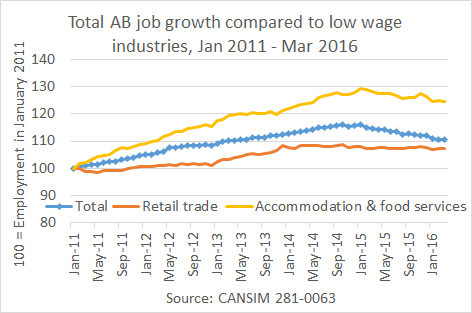Minimum wages as economic stimulus?
Update: The Alberta government has announced their timeline for getting to $15 / hour, which includes eliminating the lower minimum wage for liquor servers.
The Alberta Federation of Labour has an excellent minimum wage campaign, called “15 is fair”. I provided some research support for a paper they produced on the positive economic impact of increasing minimum wages, which you can read in full here, but I wanted to share some of the key points.
Increasing the minimum wage doesn’t kill jobs
In recent years, several provinces including Alberta have modestly increased minimum wages. Not only has the number of workers in low-wage sectors grown, but economists say that higher minimum wages can be good for reducing poverty, increasing job stability, and providing stimulus to the economy.
Since 2011, Alberta has made five upward adjustments to minimum wage – and at no point did that make a dent in employment growth in low-wage industries such as retail trade or accommodation and food services. In fact, even after the oil shock that devastated Alberta, these two low-wage sectors remain stronger than the overall Alberta labour market.
Increasing the minimum wage does lower inequality
Fortin and Lemieux (2015) show that these increases in the minimum wage actually reduced income inequality in Canada, and that the trend for the bottom 10 per cent of income earners is closely linked to changes in the minimum wage.
This is important for two reasons. First, opponents have argued that increasing the minimum wage is misguided because not all minimum wage earners are working poor. But minimum wage earners are more likely to be working poor than higher wage earners. Secondly, there is now clear evidence that minimum wages reduce inequality – which is an advisable goal separate and apart from poverty reduction.
Minimum wage increases stimulate the economy
The Federal Reserve Bank of Chicago studied the potential impact of minimum wage increases in the United States. They found that increases in the minimum wage lead to significant increases in household spending, which has a stimulative effect on the economy.
This makes sense, if we consider the fact that many low-wage workers currently can’t make ends meet. Low-wage workers are more likely to have un-met basic needs, and so spend extra income right away. Economists call this “a higher marginal propensity to consume.” The good news is that with more income, workers can better meet their basic needs, and local businesses benefit from having customers with more money to spend.
With that in mind, we can attempt to gauge the impact of an increase in the minimum wage, assuming workers spend every extra after-tax dollar in their pocket.
| Table 1: Impact of a $1 Minimum Wage increase in Alberta | ||
| Wage < $11.20 | Wage $11.21-12.20 | |
| Number of workers | 70,100 | 88,500 |
| Usual hours of work per week | 25.3 | 25.4 |
| Estimated impact on household spending | ||
| Average wage increase | $1.23 | |
| Weekly increase after CPP, EI, and Federal income tax | $3.9 million | |
| Annual increase in household spending | $201 million | |
Source: Labour Force Survey microdata, April 2016 and author’s calculations
Higher wages create more stable & productive jobs
We often talk about how to increase the number of ‘good jobs’ in our economy. Good jobs are ones where workers feel respected, where the job is stable, and where employers invest in workers.
Too often minimum wage jobs are not good jobs. But Canadian research shows that increasing the minimum wage reduces turnover, creating more stable jobs for workers.
The theory is that higher wages force employers to abandon low-wage, high turnover strategies, and instead encourages them to invest in their current workforce. Low-wage, high turnover strategies are actually costly, as it takes time and resources to find and train new employees. Lower turnover means more stable jobs for workers, and a more productive workforce for employers.
UBC economist David Green suggests that increasing the minimum wage is one of the few mechanisms that encourages employers to abandon an inefficient low-wage, high turnover strategy. This is the more important long term impact of increasing wages.


And just think if there were not only a minimum wage but full employment!
The Job Guarantee: A Government Plan for Full Employment
http://www.thenation.com/article/161249/job-guarantee-government-plan-full-employment
“The benefits of full employment include production of goods, services and income; on-the-job training and skill development; poverty alleviation; community building and social networking; social, political and economic stability; and social multipliers (positive feedbacks and reinforcing dynamics that create a virtuous cycle of socioeconomic benefits). An “employer of last resort” program would restore the government’s lost commitment to full employment in recognition of the fact that the total impact would exceed the sum of the benefits.”
2. Keynes:
“The Conservative belief that there is some law of nature which prevents men from being employed, that it is “rash” to employ men, and that it is financially ‘sound’ to maintain a tenth of the population in idleness for an indefinite period, is crazily improbable – the sort of thing which no man could believe who had not had his head fuddled with nonsense for years and years…”.
I wholeheartedly agree. The cost of living has gone up exponentially in the last 20 years, while companies have found ways to stop paying benefits and there have been little cost of living increases. However, these newer minimum wages should be indexed according to the cost of living in your province. The cost of living in BC, far outweighs, those in Saskatchewan. Everyone deserves to work for a fair wage.